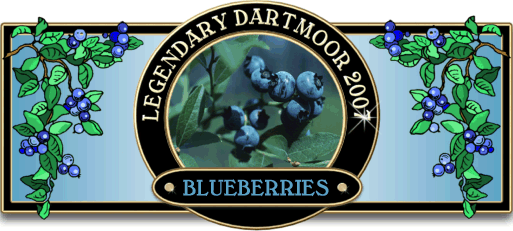
It is not very often that a new aspect of Dartmoor appears but in the case of blueberries that is exactly what has happened. Farmers and landowners are constantly being told that diversification is the only means of survival in the shrinking agricultural industry and in Lustleigh somebody has successfully heeded that advice.
Ironically the blueberry as its plant family goes (Ericaceae) is not a new phenomenon on Dartmoor and has certainly been eaten on the moor for centuries in the form of whortleberries. However, following the latest trend for ‘super fruits’ the blueberry has now made an appearance and this plant belongs to the section known as Cyanococcus which is native to North America and Asia.
It has been suggested that as blueberries contain a richness of nutrients, high levels of manganese and vitamin K they can now be classified as ‘super fruits’ and are therefore good eating. As with many of the old hedgerow medicinal traditions blueberries are becoming renown for their curative properties. It has been shown that the tannins present in blueberries can lower the levels in a protein which increases the proliferation of cancer cells. Further research suggests that by eating regular amounts of the fruit may possibly alleviate the symptoms of Alzheimer’s Disease and other aging conditions.
In view of the above benefits and the popularity of blueberries there are now two and a half acres of Dartmoor under cultivation. The land which lies above Lustleigh stands at an altitude of 183m and was originally used to grow Christmas trees. Ten years ago the landowners began planting blueberry bushes and gradually over the years their numbers grew, finally reaching the crop size of today.
The first thing the blueberry bushes need is pollinating and this is done by placing several tube-like ‘nests’ amongst the crops to attract masonry bees. Once the queens have established themselves in the nests the process of pollination begins. Then the crop needs weeding and plenty of irrigating which will eventually culminate in the season’s crop. This year’s (2007) climatic conditions of wet and warmish seem to be ideal growing conditions for the blueberries and has resulted in what the grower calls a heavy crop of, “enormous berries”.
At present the blueberries are sold through the local village shop in Lustleigh and a farm shop near Exeter. They are sold under the brand name of ‘Yonder Blueberries‘ in 125g punnets and the demand is apparently outstripping supply. The crop is expected to last throughout the picking season which runs from mid July to the end of August, with the early season crop amounting to around 100 punnets a week. The growers have ensured that no herbicides or pesticides were used on the crop which is irrigated by a system which uses rainwater. As the berries are only sold locally it means they are environmentally friendly by using virtually no food miles.
So, if you are around the Lustleigh area and fancy trying some unique Dartmoor blueberries drop into the village shop and you may be lucky to find some in stock.
 Legendary Dartmoor The many aspects past and present of Dartmoor
Legendary Dartmoor The many aspects past and present of Dartmoor

As one of the largest dedicated producers of organic blueberrries here at Dartmoor Blueberries and in the country I was disheartened to find that that the Dartmoor National Park tried to bring our business to an end including placing an enforcement notice on our small 6mx 5m blueberry shed. We won on appeal to the Secretary of State. The Dartmoor National Park Authority and indeed National Parks Authority need to reflect upon exactly what they have achieved outside of that achieved without them.